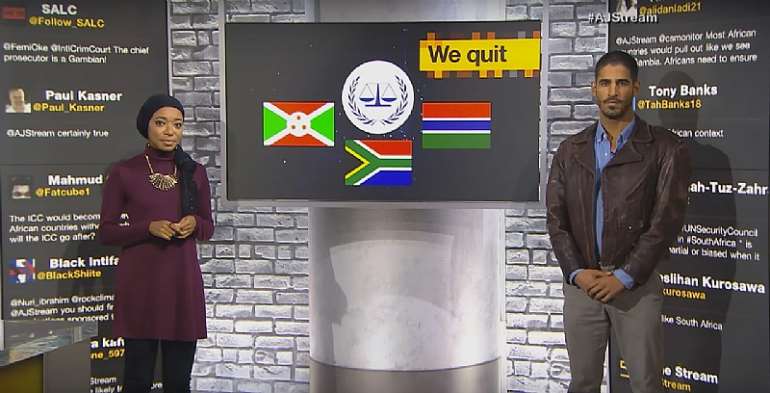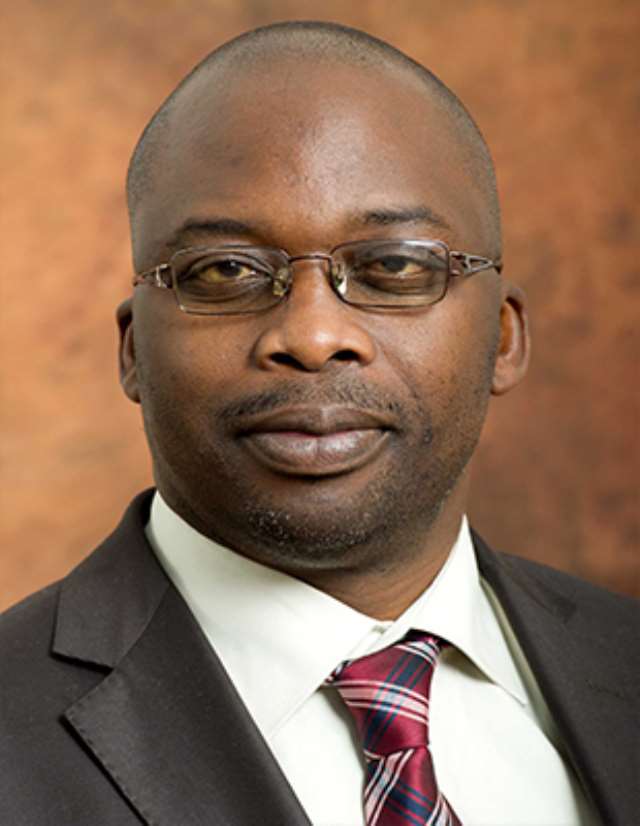“South Africa’s Diplomatic System Is Hamstrung”—Minister Masutha On ICC Withdrawal

• Why have all 23 ICC cases involved African nations?
• Legal ambiguities over diplomatic immunity “primarily” prompted exit – Masutha
Burundi, South Africa and now Gambia have withdrawn from the International Criminal Court (ICC), creating fears of a mass African exodus from what Sheriff Bojang, Gambia’s information minister, recently called the “International Caucasian Court.”
Last night’s episode of The Stream on Al Jazeera explored the reasons behind South Africa’s exit and what this means for the prosecution of genocide, war crimes and human rights abuses globally.
The Stream hosts Malika Bilal and Ahmed Shihab-Eldin started the show with some context. “The ICC is governed by an international treaty, The Rome Statute, that was signed and ratified by more than 120 countries in 1998,” said Shihab-Eldin. “Since then, all 23 cases tried before the court have involved African nations. In fact, nine of its 10 current investigations are related to countries in Africa.”
“The extent of the ICC’s power is limited,” Bilal added. “It can only investigate crimes in countries that ratified the Rome Statute. To get involved anywhere else, the court needs a referral from the United Nations Security Council, where the United States, Russia and China have veto power. None of these countries have ratified the Rome Statute so they don’t fall under the jurisdiction of the ICC, making it unlikely they would ever refer themselves.”
While admitting that the ICC “does have a disproportionate number of African cases,” lawyer Angela Mudukuti argued that the ICC isn’t targeting Africa. “If you look at the majority of the cases currently before the court, a lot of them are self-referrals, where autonomous, independent African governments have referred the situation in their own country to the ICC. So it’s more about Africans making use of the court they helped create… If you look at all of those cases, there is evidence that crimes have been committed and they should be investigated.”
Michael Masutha, South Africa’s Justice and Correctional Services minister, said South Africa’s exit was prompted less by perceived bias and more by “the legal difficulties primarily that we experienced in dealing with the court,” especially around diplomatic immunity.
Sudanese president Omar al-Bashir was used as an example during the debate. The ICC has issued two warrants for his arrest. Last year, when Bashir visited South Africa for the African Union Summit, the High Court ruled that he should not be allowed to leave the country until an application calling for his arrest had been heard. Bashir left anyway, but earlier his year the Supreme Court upheld the High Court ruling, dismissing the South African government’s claim that all delegates attending the summit were subject to diplomatic immunity.
“We were under the erroneous impression that the statute read as a whole was complementary rather than having elements of contradiction,” said Masutha. “So for example, Article 27, as we understood it, would not be interpreted to suggest that it actually nullifies Article 98… which seems to recognize continued application of the customary international law of diplomatic immunity.”
“Right now South Africa’s diplomatic system is hamstrung,” he added. “Our ability to engage in diplomatic relations is being limited by this continued legal uncertainty.”
Mudukuti disagreed. “It’s one thing to talk about discrepancies at the International Criminal Court, but if you look at domestic framework and what the courts have said, it’s clear… South Africa not only signed and ratified the Rome Statute but South Africa domesticated it… making it domestic law in this country. At that point, every single provision for the legislation was carefully considered and a conscious decision was made to make sure that there is no immunity for heads of state or senior government officials, because no one is above the law.”
Daily Maverick contributor Saul Musker criticized the exit strategy and the lack of an attempt to “resolve that problem from within the system.” He added, “This decision is effectively throwing the baby out with the bathwater.”
But Masutha countered that South Africa had actually tried to change the ICC from within first. To avoid situations like Bashir in the future, the minister said South Africa made representations at the Assembly of State Parties (ASP) in November last year to either “give proper interpretation of the statute… to eliminate the ambiguity” or “amend the statute to create legal certainty.”
Oscar van Heerden, an International Relations scholar, dismissed as “insulting” the “afro-pessimist argument” that “Africa as a continent can’t actually prosecute crimes against humanity, war crimes and genocide” without the ICC. He used Hissène Habré, the former president of Chad, as an example. “He’s now going to serve life imprisonment… That is the clearest indication that times are changing in Africa, that dictators are actually being held accountable by their citizens.”
Watch the full debate at
and follow the heated social media discussion at #ajstream.
About The Stream
The Stream is a social media community with its own daily TV show on Al Jazeera English. For more information, visit http://stream.aljazeera.com/.

